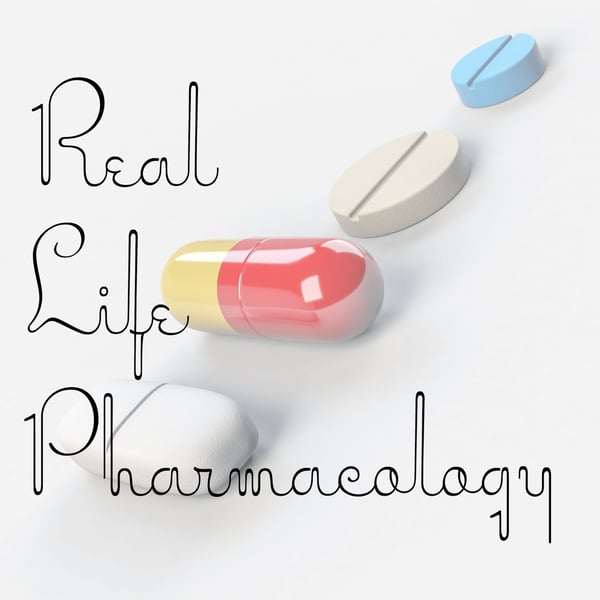Trospium Pharmacology
Real Life Pharmacology - Pharmacology Education for Health Care Professionals
Eric Christianson, PharmD; Pharmacology Expert and Clinical Pharmacist
5 • 716 Ratings
🗓️ 16 September 2021
⏱️ 11 minutes
🧾️ Download transcript
Summary
Trospium chloride (Sanctura) is a bladder antimuscarinic or anticholinergic. It blocks the action of acetylcholine in bladder smooth muscle. It is used for urinary frequency and overactive bladder. The immediate-release formulation is taken twice a day. There is an extended-release version that is more expensive.
As its classification suggests it is going to have anticholinergic effects that include dry eyes, dry mouth, constipation, urinary retention, GI tract slowing down, CNS sedation, and increased risk of falls. Compared to older bladder anticholinergics such as oxybutynin or tolterodine there is less CNS penetration. Hopefully, this will cause the patient to experience fewer CNS side effects. A downside to this being a newer medication is that it costs more.
Trospium is on the BEERS list. Look for medications started after the trospium that indicate anticholinergic side effects such as saliva substitutes, an increase in BPH medications, artificial tears, or constipation medications.
It should be administered on an empty stomach as food can block absorption. If the patient is currently taking it with food and seeing results there is no need to change how they are taking it.
Trospium is not metabolized by CYP enzymes minimizing drug interactions. Most interactions occur because of additive effects. Avoid using it with other medications on the BEERS list, especially other anticholinergic medications. Be cautious using other medications with sedative effects and CNS depression (benzodiazepines, sleep medications, opioids, alcohol) as they may have additive effects.
Transcript
Click on a timestamp to play from that location
| 0:00.0 | Hey all, welcome back to the Real Life Pharmacology podcast. I'm your host pharmacist, Eric Christensen. |
| 0:06.0 | Thank you so much for listening today. As always, go check out Real Life Pharmacology.com. |
| 0:11.7 | Go subscribe there, get your free 31 page PDF on the top 200 drugs. Great review. If you're out in |
| 0:19.6 | practice, as well as if you're going through |
| 0:21.8 | pharmacology courses, preparing for board exams, a nice little quick refresher of some of the |
| 0:28.9 | most important testable pearls, as well as some of those things that you commonly see in |
| 0:35.7 | clinical practice. So again, real-life pharmacology.com is where you can find that by subscribing. |
| 0:44.1 | All right, so let's talk about the drug of the day today, and that is trospium chloride. |
| 0:50.4 | I'll just refer to it as trospium today. |
| 0:54.8 | Brand name of this medication is Sanctura, and technically it's classification. |
| 1:01.6 | It is a bladder anticholinergic or bladder anti-muscarinic, whichever terminology you kind of prefer there. |
| 1:09.8 | It generally fits. |
| 1:11.9 | Ultimately, what this does is it blocks the action of acetylcholine in bladder smooth muscle. |
| 1:19.6 | And what that ends up doing, or what this medication is commonly used for, is urinary frequency and overactive bladder type symptoms. Dosing with this |
| 1:32.8 | medication we're going to look at twice a day, usually for the immediate release. There is an |
| 1:38.6 | extended release version as well. Generally, this is going to cost more money, unfortunately. |
| 1:47.6 | However, you know, I definitely have seen both utilized from time to time in clinical practice. |
| 1:55.6 | Now, adverse effect profile, as you could imagine, with a medication that's classified as a bladder |
| 2:03.7 | anticholinergic, you are going to have anticholinergic adverse effects. Dry eyes, dry mouth, |
| 2:12.2 | constipation, the potential for urinary retention, if we get too much of the drug there, obviously, |
| 2:19.9 | I can slow the GI track down, and then CNS sedation, potentially increasing falls risk and things of that nature. |
| 2:31.1 | However, I will mention with trosprium and in clinical practice, one of the reasons that you |
... |
Please login to see the full transcript.
Disclaimer: The podcast and artwork embedded on this page are from Eric Christianson, PharmD; Pharmacology Expert and Clinical Pharmacist, and are the property of its owner and not affiliated with or endorsed by Tapesearch.
Generated transcripts are the property of Eric Christianson, PharmD; Pharmacology Expert and Clinical Pharmacist and are distributed freely under the Fair Use doctrine. Transcripts generated by Tapesearch are not guaranteed to be accurate.
Copyright © Tapesearch 2025.

